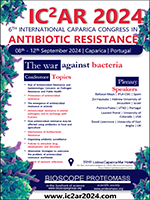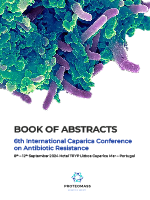
Dear Colleagues and friends
It is with great pleasure that we announce the upcoming international conference on Antibiotic Resistance, to be held in the Caparica, Portugal on 08th – 12th September 2024.
In the last years, there is a great concern about the problem of bacterial resistance to antibiotics used in human medicine as well as in veterinary.
The use of antibiotics constitutes an important factor for selection of resistance, not only among pathogenic bacteria but also among the commensal ones. Antimicrobial resistance is a major problem in public health due to the possibility in therapeutic failure.
Appearance of multiresistant bacteria is probably accompanied by co-contamination of the environment, leading to a major clinical and public health concern within the lifetime of most people living today. The extensive use has heightened concerns about the expression of antimicrobial resistance, which impacts human and animal safety, food safety and environmental exposure. Antibiotic resistance is an emergent problem, and for this reason the WHO appealed for an urgent and concerted action by governments, health professionals, industry, civil society and patients to slow down the spread of drug resistance, limit its impact today and preserve medical advances for future generations. In the latest years much investigation was developed to understand the emergence of the resistance genes and their spread but this fact does not let us to control totally this problem. In this conference an attempt has been made to present the latest research on possibilities to manage this question.
The primary objective of this meeting is to bring together researchers involved in antibiotic resistance prevention and control. The meeting will take an integrated approach to research and it will bring about researchers specializing in different subjects related to antibiotic resistance. We expected to present a universal vision of the importance of antimicrobial resistance in different ecosystems and what can be done about it.
During diverse sessions, all aspects related to epidemiology of resistance in animal and zoonotic pathogens, mobile elements containing resistance genes, proteomics of antimicrobial resistance, emerging antimicrobial resistance mechanisms, control of resistant infections, antimicrobial resistance in animal pathogens and its exchange with humans, organizing antibiotic surveillance, policies to stimulate drug development and discovery and alternatives strategies to overcome the problem of antimicrobial resistance worldwide will be discussed.
Yours truly
J. L. Capelo
C. Lodeiro
Conference chairs
On behalf of the organizing and scientific committee
Plenary Speakers
Baltasar Mayo, PhD
IPLA –CSIC (Spain)
Ecology of antibiotic resistance in dairy products
Zvi Hayouka, PhD
Hebrew University of Jerusalem (Israel)
Developing novel chemical tools to combat pathogenic bacteria
Patrícia Poeta, PhD
UTAD – Universidade de Trás-os-Montes e Alto Douro (Portugal)
What are the best practices for antibiotic use in canine and feline infectious respiratory disease?
Laurent Poirel, PhD
University of Fribourg (Switzerland)
David Livermore, PhD
University of East Anglia (UK)
Just what is good antibiotic stewardship?
Shahriar Mobashery, PhD
University of Notre Dame (USA)
Cell-Wall Recycling in Bacteria and the Nexus to Antibiotic Resistance
Gali Prag, PhD
Tel Aviv University (Israel)
Comparative benefits of constructing a split-antibiotic resistance reporter: positive selection-based toxin detoxification versus essential metabolite synthesis
KPRK Talks
XXX, PhD
Affiliation:
Title: Avaliable soon.
Keynote Speakers
Kenneth Burch, PhD
Boston College (USA)
A Platform for Personalized Medicine and Epidemiology
Elena Gómez-Sanz, PhD
University Hospital of Basel (Switzerland)
Elizabeth Grohmann, PhD
Berlin University of Applied Sciences (Germany)
Horizontal antimicrobial resistance transfer mechanisms in biofilms
Robert Bonomo, PhD
Case Western Reserve University (USA)
Rachel Powers, PhD
Grand Valley State University (USA)
Structural insights on β-lactamase mediated resistance in A. baumannii
Bruno Gonzalez-Zorn, PhD
University Complutense of Madrid (Spain)
Ganjun Yuan, PhD
College of Bioscience and Bioengineering, Jiangxi Agricultural University (China)
Drug combinations to prevent antimicrobial resistance: theory, scheme and practice
Tomasz Jarzembowski, PhD
Medical University of Gdánsk, Gdánsk (Poland)
Unexpected results of non antimicrobial pharmacotherapy: changes of bacterial resistance to beta-lactams
Ivan Rychlik, PhD
Veterinary Research Institute, Brno (Czech Republic)
Probiotics as an alternative to antibiotics: Lessons taken from chicken – microbiota interactions
Latania Logan, PhD
Emory University School of Medicine (USA)
Tackling the AR Conundrum: The role of community reservoirs in the spread of antibiotic resistance among children and healthy populations
Mara di Giulio, PhD
University of “G. d’Annunzio” Chieti-Pescara (Italy)
New strategies to tackle the antimicrobial resistance/tolerance in Helicobacter pylori infection
Yvonne Agersø, PhD
Novonesis; Copenhagen University (Denmark)
Intrinsic tetracycline resistance tet(L) sub-classes in Bacillus subtilis group species differ from the plasmid associated tet(L) found widespread in Gram-positive species
Melissa Brown, PhD
Flinders University (Australia)
QacA-mediated biocide resistance in staphylococci
Mayland Chang, PhD
University of Notre Dame (USA)
Andrei Osterman, PhD
Sanford Burnham Prebys Medical Institute (USA)
Yuk Sham, PhD
University of Minnesota (USA)
Anthony Schryvers, PhD
University of Calgary (Canada)
Patrick Loll, PhD
Drexel University College of Medicine (USA)
Thilo Köhler, PhD
University of Geneva (Switzerland)
Luís Pacheco, PhD
Federal University of Bahia (Brazil)
Symposium Subjects
- Rise of Antimicrobial Resistance and Epidemiology: Concerns on Pathogen Resistance and Public Health
- A public health approach to antimicrobial Resistance
- Genetics of antimicrobial resistance
- Proteomics of antimicrobial resistance
- The emergence of antimicrobial resistance in animals
- Antimicrobial resistance in animal pathogens and its exchange with humans
- How antimicrobial resistance may be affected by the use of antibiotics in food and agriculture
- Mechanisms of Antibacterial Resistance
- Organizing antibiotic surveillance
- Policies to stimulate drug development and discovery
- Alternative Strategies to overcome the problem of antimicrobial resistance worldwide
- Control of resistant infections
Hotel TRYP Lisboa Caparica Mar
Be aware of cold calls from Convention Hotel Services (CHS) or from someone named Adam Max! A company called CHS (Convention Hotel Services) is calling or e-mailing attendees of conferences worldwide, claiming to work for the conference organizers and asking for credit card details to finalize the booking of accommodation. If you receive such a call or e-mail, do not give away any personal information or credit card details! None of the parties involved in the organization of IC2AR 2024 is working with CHS
We look forward to seeing you soon.
With kindest regards
The BIOSCOPE Team















